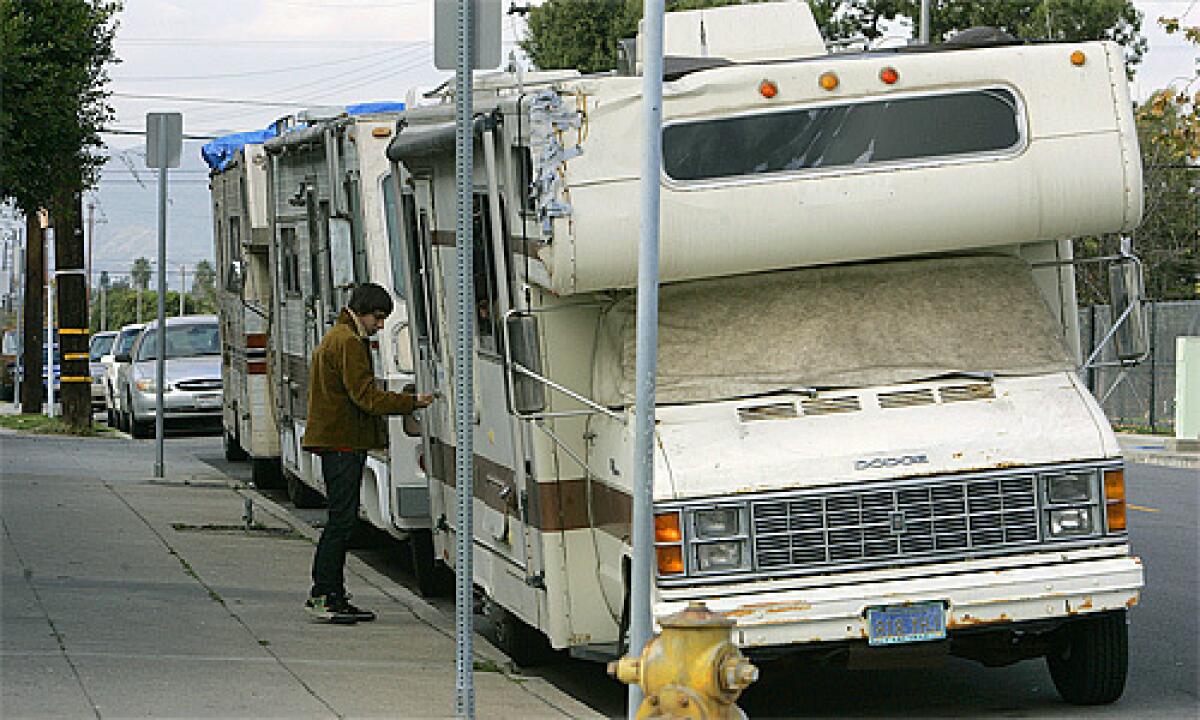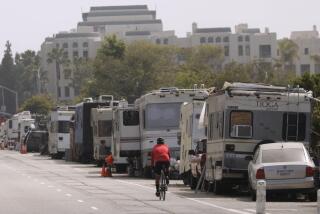Special zones urged for people who sleep in RVs, cars in Venice

Tough economic times have spilled onto the streets of Venice, which has become a favorite place to park for scores of otherwise homeless people living in cars and campers. The practice has ignited a mini-uprising among residents living in the pricey coastal community.
The number of cars and recreational vehicles has swelled so much over the last year that Councilman Bill Rosendahl, who represents the city’s coastal areas, has proposed creating special zones away from neighborhoods where people can sleep in their vehicles.
“The community has been going ballistic,” Rosendahl said. “They can’t park their own cars. Some of the folks who live in their cars and in campers defecate and urinate outside and create other issues of quality of life and health.”
His proposal, similar to programs in Santa Barbara and Eugene, Ore., would allow the cars and recreational vehicles to park in select “municipal properties, parking lots of churches or community-based organizations, industrial areas and other areas that would have minimal impact on residential communities.”
Current city laws prohibit sleeping in a car or RV on the street.
“Let’s stop kidding ourselves,” Rosendahl said. “People are living in their cars. . . . So let’s deal with the reality. In this economic downturn, it’s even increasing.”
Up to 200 people are living in campers or cars in the Venice area, which has many residential areas where overnight parking is not restricted, the councilman said. As part of his proposal, which is expected to be heard by a council committee within the next few weeks, neighborhoods in Venice would have the option of restricting overnight parking to residents who live in apartments and houses.
However, some Venice residents said they feared that Rosendahl’s plan might also designate certain residential streets in the beach-side community as RV zones.
“We don’t believe the solution is turning residential areas into urban RV campgrounds,” said Mark Ryavec, who heads the Venice Stakeholders Assn., which recently submitted to Mayor Antonio Villaraigosa and the council a petition with 237 signatures of residents opposed to Rosendahl’s proposal.
Residents in parts of Venice have for years battled what they view as an incursion by RV dwellers. The tensions are particularly pronounced in and near the Oakwood section, a roughly one-square-mile area bounded by California Avenue, Lincoln Boulevard, Rose Avenue and Abbot Kinney Boulevard. Residents complain that some RV occupants defecate in alleys, party into the wee hours, and dump waste into gutters and storm drains.
Ryavec, co-chairman of a neighborhood council committee that is studying homelessness and RV living, said the panel has identified more than 20 “relatively isolated” sites in Rosendahl’s 11th Council District that could each accommodate five to 10 RVs. They include an area across from the Dockweiler State Beach RV park, vacant rental-car lots in Westchester, and an RV and boat storage lot off Lincoln Boulevard. He said, however, that many RV dwellers “want to stay in Venice.”
Terry, an RV dweller in Venice who spoke on the condition that her last name not be used because she feared retribution from residents, said more people have been forced to live in their vehicles because of the tough economy, the rash of condo conversions that have left many tenants without shelter and rules limiting overnight parking on certain streets in Santa Monica and Los Angeles’ Westside.
Terry said Los Angeles police officers have proposed that she and others move their RVs to the area across from Dockweiler State Beach.
“That’s 10 miles away,” Terry said, as she exercised her dog near the Oakwood Recreation Center one recent evening. Her 1976 blue-and-white RV stood across the street. “These vehicles aren’t going to make it down there.”
She said such a move would be a hardship because her two teenage children attend school in the area; her daughter also works at a nearby restaurant. For the last three years, she and her children have lived in their car, a van and now the RV, which she said she bought for $850 when it was in fine working order.
Since then, she said, people that she suspects are Venice residents have sliced her tires, put gravel in her gasoline tank, stolen her son’s clothes and dented the RV’s door with clubs.
“We can’t tell the police,” she said, adding with a note of irony: “We’re the criminals.”
In Santa Barbara, another town along the California coast that has become a favorite locale for people living in vehicles, the city started an “RV Safe Parking” program four years ago as part of its outreach to the homeless.
Seventy-five people have received permits to participate in the program, parking their cars at night in various city and county lots, as well as some operated by churches. Under a city contract, the New Beginnings Counseling Center has an outreach worker check on participants at least twice a week, referring them to housing and job assistance programs as well as other services that cater to their financial, physical and mental well-being.
Participants are required to provide their own restroom facilities, either in an RV or a portable toilet if they have a car, said Gary Linker, executive director of New Beginnings.
They must also follow a list of rules, and there have only been a few complaints from nearby residents over the last four years, he said. Those who apply for the program -- there is a waiting list -- are interviewed by the outreach worker to make sure they qualify.
“We have to make sure people aren’t traveling through on vacation. This isn’t a KOA,” Linker said.
Rosendahl said his proposal is limited to the coastal district he represents, since Venice has been “overwhelmed,” but it directs the council to address the issue of RV and car dwellers on a district-by-district basis. He also emphasized that the measure was meant to “kick the process in gear,” with the understanding that plenty of related issues still must be debated and resolved.
That includes whether to limit the RV zones to people who can prove they have roots in the area.
That became an issue in Ontario in 2007, when the city set up a secure “tent city” near the airport for the homeless, complete with bathroom and shower facilities.
When hundreds of people from outside the San Bernardino County city descended on the site, Ontario officials decided to limit it to people who could produce documents showing that they had lived in the city.
“There is not an easy answer,” Rosendahl said. “But at least this raises the issue of homelessness to a higher level.”
More to Read
Sign up for Essential California
The most important California stories and recommendations in your inbox every morning.
You may occasionally receive promotional content from the Los Angeles Times.












